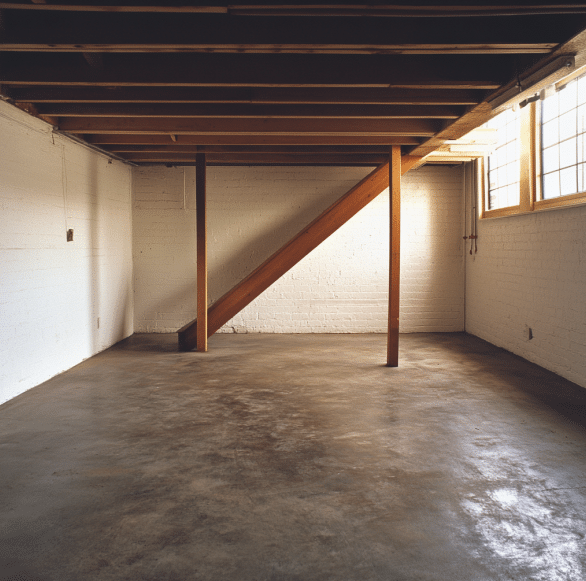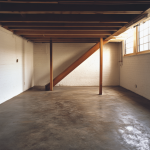Just as you’re sorting through those old photo albums in your basement, you notice a musty odor, damp walls, and some suspicious-looking mold. It’s not a pleasant discovery, is it?
Now, you’re probably wondering if these are mere inconveniences or signs that your basement needs some serious waterproofing. Well, you aren’t alone. Many homeowners grapple with this issue, not knowing when it’s time to act.
Understanding the signs that indicate a need for basement waterproofing is crucial, not just to maintain the aesthetics of your home, but also to prevent potential health hazards. So, let’s tackle this together, shall we?
Key Takeaways
- Damp spots, peeling paint, musty odors, and mold growth are signs indicating the need for basement waterproofing.
- Flooding in the basement can lead to structural damage, mold growth, electrical hazards, and property destruction.
- Proper ventilation is essential to prevent moisture buildup, control temperature, eliminate odors, and improve indoor air quality in the basement.
- Regularly evaluating the foundation for moisture penetration, efflorescence, cracks, or fractures is crucial to identifying potential waterproofing needs and avoiding costly damage in the long run.
Identifying Signs of Moisture
Before you can address potential water issues in your basement, you’ll need to identify the signs of excess moisture. It’s crucial to be proactive. Don’t wait for a disaster to happen, look for early indicators like damp spots on walls or floors, peeling paint, or a musty odor.
If you notice any of these signs, it’s likely that there’s an excess of moisture present. Additionally, look for growth of mold or mildew – a clear sign of high humidity. These fungi thrive in damp environments and can cause health problems if left unchecked.
Another indicator is condensation on your windows, pipes, or other metal surfaces. This might suggest that the air in your basement is too humid, causing moisture to condense on cooler surfaces.
Last but not least, if you have a finished basement, check your carpets and drywall for dampness; they can absorb moisture from the air and the ground, and prolonged exposure can lead to decay.
Understanding the Dangers of Mold
While recognizing signs of moisture in your basement is crucial, it’s equally important to understand the potential health risks associated with one of the most common indicators: mold. Mold, a type of fungus that thrives in damp environments, can pose serious health risks if left unchecked.
You mightn’t know it, but prolonged exposure to mold can lead to respiratory issues. If you or anyone in your home has allergies, asthma or other respiratory conditions, mold can exacerbate these problems. Common symptoms include coughing, wheezing, and difficulty breathing.
Moreover, mold can cause eye, skin, and throat irritation even in healthy individuals. Prolonged exposure can lead to more serious conditions like mold-induced asthma or hypersensitivity pneumonitis, a condition that resembles pneumonia.
Beyond health risks, mold can damage the structural integrity of your home. It can eat away at the materials it grows on, causing decay and disintegration over time.
The Impact of Basement Flooding
Experiencing a basement flood can be devastating, leading to significant structural damage and potential health risks if not properly addressed. The water seeping into your basement can weaken the structural integrity of your home, causing issues like cracks in the foundation or walls. It’s not just about immediate damage either; over time, these structural problems can worsen, leading to potentially costly repairs down the line.
In addition to structural damage, flooding can also create a breeding ground for mold and mildew. These fungi can proliferate quickly in a damp environment, leading to poor indoor air quality. Exposure to mold spores can cause a host of health problems, especially for those with respiratory conditions or allergies.
Moreover, flooded basements can cause electrical hazards. Water can damage electrical outlets, wiring, and appliances, creating a dangerous situation that could lead to fires or electrical shocks.
Lastly, personal property and sentimental items stored in your basement can be ruined. These losses can be heartbreaking and often irreplaceable. Thus, to mitigate these risks, it’s essential to waterproof your basement promptly and adequately. It’s a wise investment that could save you a lot in the long run.
Role of Proper Ventilation
In addition to waterproofing, ensuring proper ventilation in your basement plays a critical role in maintaining the overall health and structural integrity of your home. A well-ventilated basement prevents a myriad of issues that can be detrimental to your house’s structure and indoor air quality.
- Prevents moisture buildup: Moisture can lead to mold growth, which can damage your home’s structure and lead to health problems. Good ventilation helps reduce this risk.
- Controls Temperature: Proper ventilation helps regulate the basement’s temperature, preventing it from becoming too hot or too cold, which can impact your home’s overall energy efficiency.
- Eliminates Odors: Basements often become musty due to lack of airflow. Ventilation keeps the air fresh, improving the overall indoor environment.
- Prevents Infestations: Damp, stagnant environments attract pests. Good ventilation discourages these unwelcome visitors.
Evaluating Your Home’s Foundation
Before moving forward with any waterproofing efforts, it’s crucial that you first carefully evaluate the condition of your home’s foundation. A solid, undamaged foundation is critical to the overall structural integrity of your home, and it’s also the cornerstone of effective basement waterproofing.
Look for signs of moisture penetration, including damp spots, water stains, or efflorescence (chalky white deposits). Also, keep an eye out for cracks or fractures in the foundation walls, as these can indicate more serious problems.
To help you assess your foundation’s condition, here’s a simple table:
| Condition | Potential Issue |
| Damp spots or water stains | Possible water leakage |
| Efflorescence | Indicates past water penetration |
| Cracks or fractures | Could signify structural issues |
If you find any of these conditions, it’s advisable to consult with a professional. They can provide a thorough inspection and recommend necessary repairs or waterproofing methods. Remember, ignoring or delaying addressing these issues can lead to more extensive, costly damage over time. So, take the time now to evaluate your foundation and ensure you’re starting your waterproofing efforts from a solid base.
Frequently Asked Questions
What Are the Costs Associated With Basement Waterproofing?
Determining the costs associated with basement waterproofing can vary greatly. You’ll need to consider factors such as the size of your basement, the extent of the water damage, and the methods used for waterproofing.
On average, you could be looking at anywhere from $500 for minor repairs, up to $10,000 for a full-scale waterproofing job. It’s best to get several quotes before making a decision.
How Long Does a Waterproofing Job Typically Take?
The duration of a basement waterproofing job can greatly vary. On average, you’re looking at anywhere between 1-3 days for basic waterproofing.
However, if your basement has significant issues, such as foundation repairs, it could take up to a week. It’s crucial you get a time estimate from professionals before starting, so you’re not left in the lurch.
Are There Different Methods of Basement Waterproofing and How Do I Know Which One Is Right for My Home?
Yes, there are different methods of basement waterproofing. It’s important to choose one that’s right for your home. You’ll need to consider factors like your budget, the severity of the moisture problem, and the construction of your basement.
A professional can help identify the best method for your situation. If you’ve noticed persistent dampness, mold growth, or water damage, it’s a good sign that your basement would benefit from some form of waterproofing.
Can I Waterproof My Basement Myself or Do I Need to Hire a Professional?
Imagine standing in your basement, tools in hand, ready to tackle waterproofing. Yes, you can do it yourself. However, it’s intricate work that requires knowledge and experience.
If done incorrectly, it could lead to bigger issues. Hiring a professional ensures the job’s done right the first time. They’ll analyze your basement’s needs, choose the appropriate method, and install it efficiently. You’ll save time and potentially avoid costly mistakes.
What Maintenance Is Required After My Basement Has Been Waterproofed?
After your basement’s been waterproofed, regular maintenance is crucial. You’ll need to inspect the area for any signs of moisture or damage every few months.
Clear any debris from your gutters and ensure your downspouts direct water away from your home’s foundation. In addition, check your sump pump regularly to ensure it’s working properly.
If you see any signs of moisture or damage, contact a professional immediately.
Conclusion
Don’t let fears of cost deter you from waterproofing your basement. Unchecked moisture, mold risks, flood damage, and poor ventilation can wreak havoc on your home’s foundation.
Being proactive not only safeguards your home’s structural integrity but also ensures a healthy living environment. Remember, your home is an investment, and taking steps to protect its foundation is a wise decision that will pay off in the long run.



